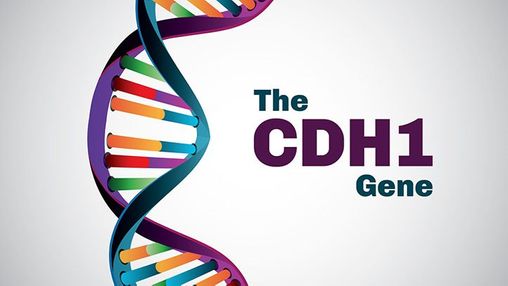Gene Mutation CDH1 and Cancer Risk

What Is the CDH1 Gene?
CDH1 is a gene that delivers instructions for making a protein called epithelial cadherin (E-cadherin).
If You Carry a CDH1 Mutation, What Cancers Are You At Risk For?
If you have a mutation, or change, in this gene, you may be more likely to develop: (1)
- Hereditary diffuse gastric cancer (HDGC), an inherited cancer disorder that increases the risk for stomach cancer
- Lobular breast cancer, breast cancer that begins in the milk-producing glands of the breast
- Ovarian cancer
- Prostate cancer
- Colon cancer
- Blepharocheilodontic syndrome, a disorder that causes birth abnormalities such as a cleft lip, cleft palate, or both
How Does CDH1 Increase Your Risk for Cancer?
A normal CDH1 gene tells your body to make E-cadherin. This protein is found within the membrane that surrounds epithelial cells — special cells that line the outer surfaces of your body (such as the skin and the outer surface of blood vessels and organs).
E-cadherin has many important roles, including binding cells together, controlling cell movement and development, helping transmit chemical signals within cells, and regulating the activity of specific genes. Additionally, E-cadherin acts as a tumor suppressor, which means it stops cells from growing uncontrollably or dividing too quickly. (1)
Can You Be Tested for CDH1?
Yes, genetic testing is available to identify CDH1 mutations.
Your doctor may recommend genetic testing for the CDH1 mutation if you have relatives with a documented CDH1 genetic mutation; you or other family members develop any cancers associated with the CDH1 genetic disorder; or if you have other risk factors.
Genetic testing for CDH1 usually involves providing a blood sample for analysis in a lab.
You may want to talk to a genetic counselor who can help you evaluate your family history, tell you the pros and cons of the test, and help you understand your results. (2)
Why Is It Important to Know if You Are At Risk for CDH1?
Knowing you have a CDH1 abnormality can help you determine your risk for developing certain cancers or other problems. It’s also helpful information for family members who might be at risk, too.
People with CDH1 mutations that are associated with HDGC have between a 56 and 70 percent chance of developing stomach cancer in their lifetime. Women with CDH1 abnormalities have a 40 to 60 percent chance of having lobular breast cancer. (1,3)
If you have a CDH1 mutation, you have a 50 percent chance of passing it on to each of your children. (2)
History of the CDH1 Gene: When Was It Discovered?
In 1998, researchers in Australia discovered the CDH1 gene in a New Zealand Maori family with a history of stomach cancer. Since then, CDH1 mutations have been identified in more than 100 families of diverse ethnic backgrounds, including European, African American, Japanese, Korean, Pakistani, and others.
Interestingly, historians believe Napoleon Bonaparte’s family carried the CDH1 mutation. (2,4)
What Do You Do if You Test Positive for CDH1?
If you test positive for a CDH1 mutation, your doctor will likely suggest you have earlier and more frequent cancer screenings.
For some people, an endoscopy procedure or biopsy to look for stomach cancer might start in the teen years. Women may need to begin yearly mammograms and MRIs earlier than usually recommended, and men and women may want to have annual colonoscopies at younger ages.
Screening methods may not always spot stomach cancer. Talk to your doctor about all your screening and prevention options. (5)

Ryland J. Gore, MD, MPH
Medical Reviewer
In addition to her professional responsibilities, Gore previously served on the board of directors for Every Woman Works, an Atlanta-based nonprofit organization whose mission is to empower women and help them transition into independence and stability from common setbacks. Gore served as the chairwoman of the American Cancer Society’s Making Strides Against Breast Cancer campaign in Atlanta for three years (2019 to 2021). She is currently the co-director of Nth Dimensions’ Strategic Mentoring Program and the alumni board chair of the Summer Health Professions Educational Program (SHPEP), which is a collaborative effort by the Robert Wood Johnson Foundation, Association of American Medical Colleges, and the American Dental Education Association.
Gore is a highly sought after speaker, consultant, and lecturer on breast cancer and breast health, as well as women’s empowerment topics.

Julie Lynn Marks
Author
Julie Marks is a freelance writer with more than 20 years of experience covering health, lifestyle, and science topics. In addition to writing for Everyday Health, her work has been featured in WebMD, SELF, Healthline, A&E, Psych Central, Verywell Health, and more. Her goal is to compose helpful articles that readers can easily understand and use to improve their well-being. She is passionate about healthy living and delivering important medical information through her writing.
Prior to her freelance career, Marks was a supervising producer of medical programming for Ivanhoe Broadcast News. She is a Telly award winner and Freddie award finalist. When she’s not writing, she enjoys spending time with her husband and four children, traveling, and cheering on the UCF Knights.
- CDH1 Gene. MedlinePlus. August 1, 2017.
- CDH1 Gene Mutation. Stanford Health.
- Cancer Risk Associated With Inherited CDH1 Mutations. FORCE: Facing Our Risk of Cancer Empowered. September 19, 2022.
- Family’s Genetic Death Sentence — and Genetic Escape. Stanford News. May 24, 2006.
- Risk Management for People With Inherited CDH1 Mutations. FORCE: Facing Our Risk of Cancer Empowered. September 19, 2022.